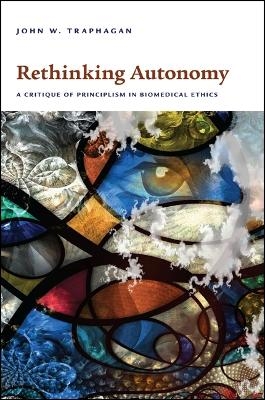
Rethinking Autonomy
State University of New York Press (Verlag)
978-1-4384-4553-3 (ISBN)
This groundbreaking book offers a critical examination of the concept of autonomy, one with major implications for biomedical ethics. Working from the perspectives of ethnography and medical anthropology, John W. Traphagan argues that the notion of autonomy as a foundational principle of a common morality, the view dominant in North America, is inadequate as a universal moral category because culture deeply influences how people think about autonomy and the fundamental nature of being human. Drawing from fieldwork in Japan, Traphagan reveals a notably different sensibility, demonstrating how Japanese moral concepts and actions are based upon a deep awareness of the social embeddedness of people and an aesthetic sensitivity that emphasizes context and situation over universality in making moral evaluations of behavior. Traphagan develops data from Japan into a critical examination of how scholarly research in biomedical ethics, and ethics more generally, is conducted in North America. Arguing in a vein related to the emerging area of naturalized biomedical ethics, Traphagan proposes the creation of an empirically grounded study of moral behavior.
John W. Traphagan is Associate Professor of Religious Studies at the University of Texas at Austin and also Secretary General of the Japan Anthropology Workshop. He is the author of Taming Oblivion: Aging Bodies and the Fear of Senility in Japan and the coeditor of Imagined Families, Lived Families: Culture and Kinship in Contemporary Japan (with Akiko Hashimoto); Wearing Cultural Styles in Japan: Concepts of Tradition and Modernity in Practice (with Christopher S. Thompson); and Demographic Change and the Family in Japan's Aging Society (with John Knight), all published by SUNY Press.
Acknowledgments
1. Inventing Ethics
1.1 The Problem of Common Morality
1.2 Embodied Culture
1.3 Thinking About Culture
1.4 What Is Culture?
1.5 Memory, Culture, Ethics
2. Self, Autonomy, and Body
2.1 Principles and Ethics
2.2 Autonomy
2.3 What Is a Human?
2.4 Culture, Mind, and Body
2.5 Categories of a Person and Self
2.6 The Nature of Humans
2.7 Mind and Body, Inside and Outside
3. Autonomy and Japanese Self-Concepts
3.1 Self and Other
3.2 The Individual Self
3.3 Self and Childhood Development
3.4 The Processive Self
3.5 Moral Selves and Autonomy
4. Autonomies, Virtue, and Social Change
4.1 Self, Virtue, and Character
4.2 Family, Self, Society
4.3 Autonomy, Family, and Social Change
5. Mental Health, Suicide, and Self-Centered Behavior
5.1 Self and Other
5.2 Suicide as Medical and Analytical Category
5.3 Suicide and Self-Killing in Japan
5.4 Death
6. Emotion, Aesthetics, and Moral Action
6.1 Situational Ethics in Japan
6.2 The Obasuteyama Legend
6.3 Harmony and Sincerity
6.4 Japanese Ethics
7. Rethinking Autonomy
References
Index
| Erscheint lt. Verlag | 1.1.2013 |
|---|---|
| Zusatzinfo | Total Illustrations: 9 |
| Verlagsort | Albany, NY |
| Sprache | englisch |
| Maße | 152 x 229 mm |
| Gewicht | 354 g |
| Themenwelt | Geisteswissenschaften ► Philosophie ► Ethik |
| Medizin / Pharmazie ► Medizinische Fachgebiete ► Medizinethik | |
| Studium ► Querschnittsbereiche ► Geschichte / Ethik der Medizin | |
| Sozialwissenschaften ► Soziologie | |
| ISBN-10 | 1-4384-4553-9 / 1438445539 |
| ISBN-13 | 978-1-4384-4553-3 / 9781438445533 |
| Zustand | Neuware |
| Haben Sie eine Frage zum Produkt? |
aus dem Bereich


